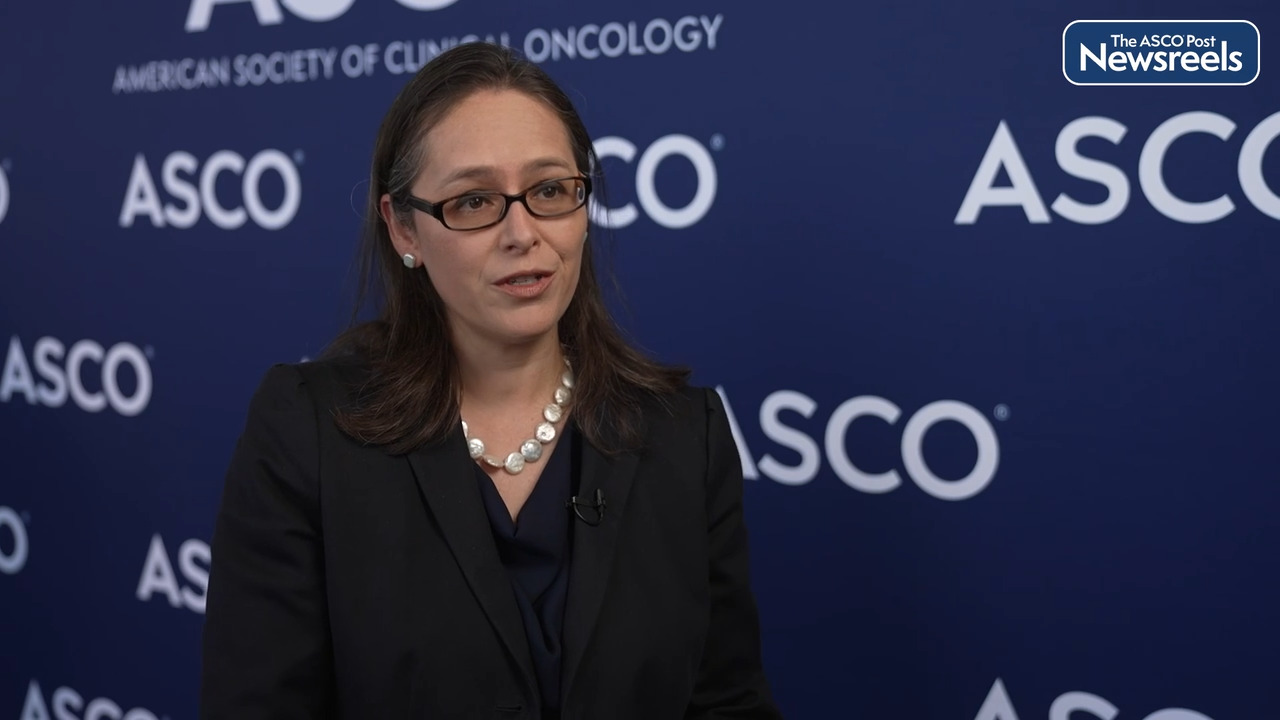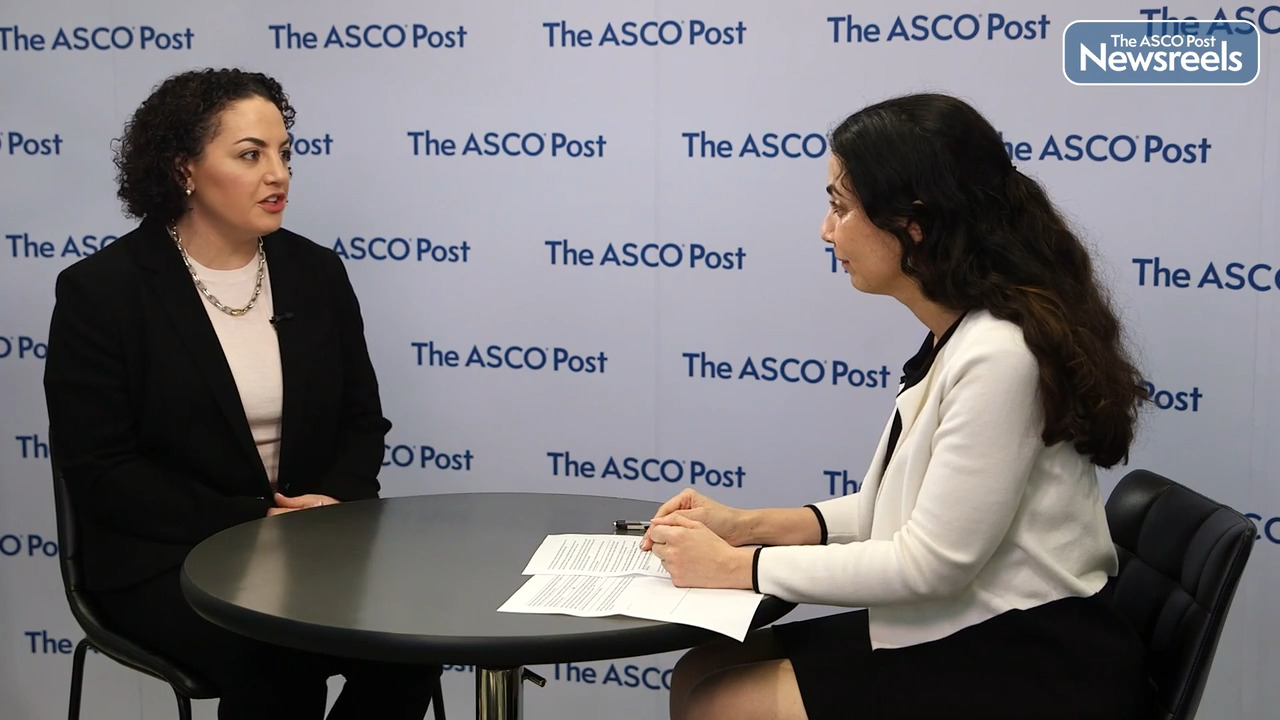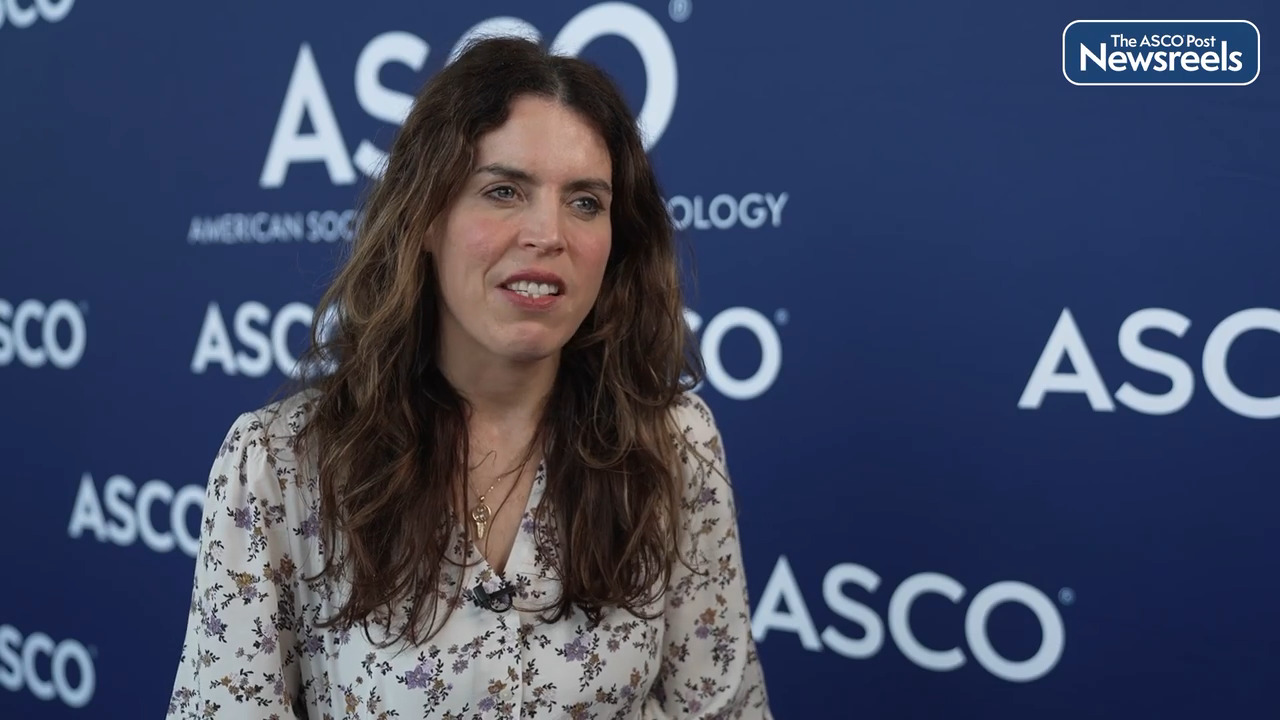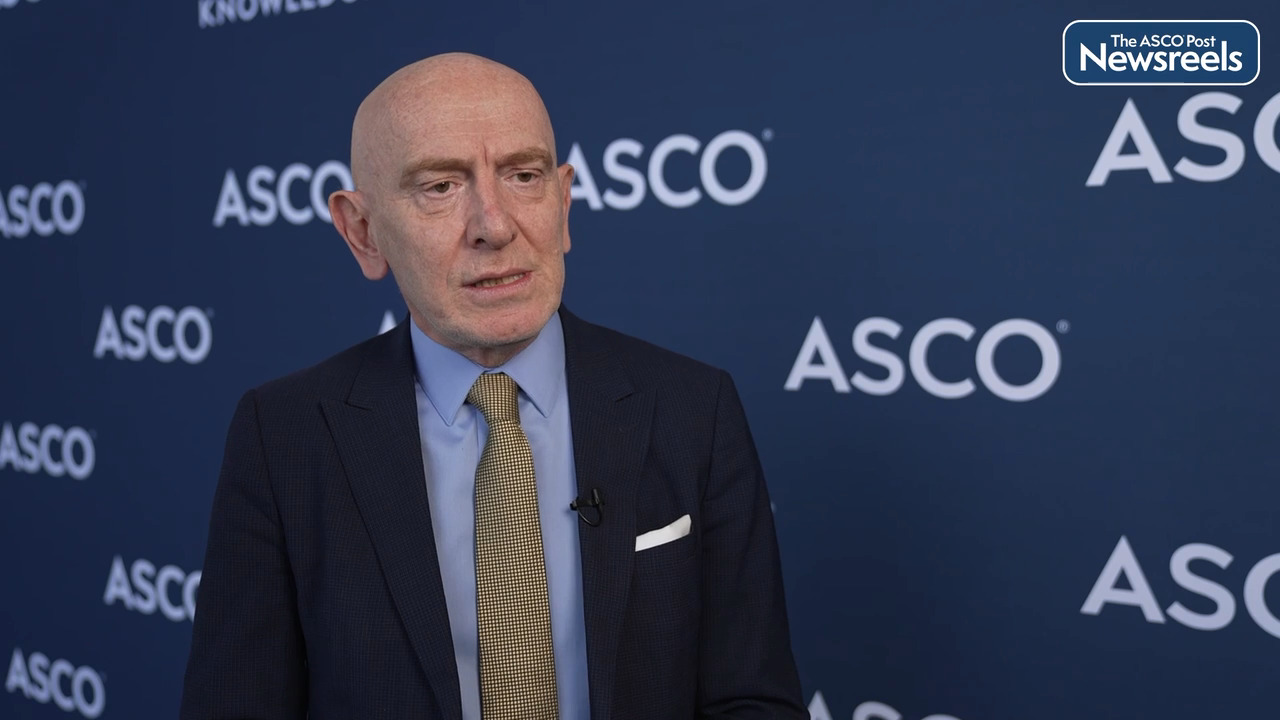Nagla Abdel Karim, MD, on Small Cell Lung Cancer: SWOG S1929 Results on Atezolizumab Plus Talazoparib
2023 ASCO Annual Meeting
Nagla Abdel Karim, MD, of the Inova Schar Cancer Institute, University of Virginia, discusses phase II data showing that maintenance atezolizumab plus talazoparib improved progression-free survival in Schlafen-11–selected patients with extensive-stage small cell lung cancer. This study demonstrated the feasibility of conducting biomarker-selected trials in this disease, paving the way for future evaluation of novel therapies in selected populations (Abstract 8504).
Transcript
Disclaimer: This video transcript has not been proofread or edited and may contain errors.
Small cell lung cancer is the most aggressive cancer amongst all types of lung cancer. We basically need to find better novel therapies, in addition to finding predictive biomarkers to select the best therapy for the appropriate patient population. We do know that PARP is highly expressed in small cell lung cancer and large cell neuroendocrine carcinoma tumors. And thus, PARP inhibition has been one of the promising novel agents to use.
However, we also know that Schlafen-11 is a predictive biomarker. It has been shown by Dr. Byers and colleagues that PARP inhibitors have been noted to have improved outcome in patients with Schlafen-11 positive patients. Also, Talazoparib has been noted to be one of the most potent PARP inhibitors. We designed our study to enroll patients with Schlafen-11 positive small cell lung cancer in order that they can receive the standard of care induction therapy with platinum etoposide Atezolizumab.
However, when it comes to the maintenance part, they were randomized into arm A where they would receive standard of care Atezolizumab versus Atezolizumab plus Talazoparib, which is a PARP inhibitor. Reason is because we wanted to utilize that the PARP inhibitors are going to act very well in patients with Schlafen-11 positive status, and also because they do have a synergism to immunotherapies like PD-L1 inhibitors like Atezolizumab. That was the concept of the study and the design, with the main primary objective of progression-free survival.
The study actually achieved its primary endpoint, and primary objective was met, where patients with Schlafen-11 positive small cell lung cancer when treated with atezolizumab and Talazoparib, they had a median progression-free survival of 4.2 months compared to 2.8 months of patients on the control arm. Having said that, we mentioned that it is still a small study. It's a phase two study. This is a good signal into a predictive biomarker based therapy. But in addition, also, the feasibility of having a biomarker in small cell lung cancer is very, very promising. There were only seven days median time to obtain the results of Schlafen-11, which is very reasonable for patients to select their maintenance therapy.
Having said that, also, I want to mention that we are going to work into the levels of Schlafen-11, where they have high expression or lower expression, in correlation with the clinical outcome. That's the next step. Another follow up part is that this study actually starts the wave of new concepts where we can design studies in small cell lung cancer towards personalized approach rather than all comers, which of course was very useful to see in non-small cell lung cancer. If we can implement this in small cell lung cancer and get even more predictive biomarkers with basically Schlafen-11, but also with the subtypes of small cell lung cancer, and other markers, we also heard about in our ASCO 2023, like Dll3 and so on. If we can combine all those efforts together as the next step, this will be one of the best next movements.
Related Videos
The ASCO Post Staff
Paula Aristizabal, MD, MAS, of the University of California, San Diego, and Rady Children’s Hospital, talks about using a health systems strengthening approach to improve leukemia care and survival in a public Mexican hospital in the region of the border between the United States and Mexico. The demonstrated increase in overall survival across a decade after implementation of the program seems to validate the use of such models, not only to improve clinical outcomes, but also to build sustainable hospital capacity, financially and organizationally (Abstract 1502).
The ASCO Post Staff
Allison Betof Warner, MD, PhD, of Stanford University Medical Center, and Zeynep Eroglu, MD, of H. Lee Moffitt Cancer Center and Research Institute, discusses phase II findings showing that in patients with BRAF-mutant metastatic melanoma, dabrafenib plus trametinib and navitoclax (DTN) was associated with a complete response rate of 20% and an overall response rate of 84%. Additionally, there was a trend toward improved overall survival in patients treated with DTN compared with dabrafenib plus trametinib alone; the difference in overall survival was more pronounced in patients with a smaller tumor burden (Abstract 9511).
The ASCO Post Staff
Claire Roddie, PhD, MBChB, of University College London, discusses results of the FELIX study, which showed that the second-generation chimeric antigen receptor (CAR) T-cell therapy obecabtagene autoleucel is safe for adults with relapsed or refractory B-cell acute lymphoblastic leukemia, even those with a high burden of disease. This agent yielded high rates of complete response and ongoing CAR T-cell persistence in most patients whose disease responded (Abstract 7000).
The ASCO Post Staff
Muhit Özcan, MD, of Turkey’s Ankara University School of Medicine, discusses phase II findings from the waveLINE-004 study. It showed that the antibody-drug conjugate zilovertamab vedotin had clinically meaningful antitumor activity in patients with relapsed or refractory diffuse large B-cell lymphoma (DLBCL) who experienced disease progression after, or have been ineligible for, autologous stem cell transplantation and/or chimeric antigen receptor T-cell therapy (Abstract 7531).
The ASCO Post Staff
Lisa A. Carey, MD, of the University of North Carolina at Chapel Hill, and Javier Cortes, MD, PhD, of the International Breast Cancer Center and Universidad Europea de Madrid, discuss phase II findings showing that one in three patients with HER2-positive early breast cancer may safely omit chemotherapy. Among the chemotherapy-free patients treated with trastuzumab and pertuzumab, the 3-year invasive disease–free survival was 98.8%, with no distant metastases (Abstract LBA506).





